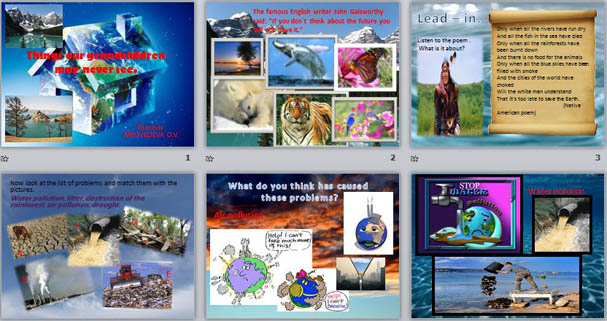
Things our grandchildren may never see.
Teacher: MEDVEDEVA O.V.

The famous English writer John Galsworthy said: "If you don`t think about the future you will not have it."

Lead – in.
Only when all the rivers have run dry
And all the fish in the sea have died
Only when all the rainforests have been burnt down
And there is no food for the animals
Only when all the blue skies have been filled with smoke
And the cities of the world have choked
Will the white man understand
That it’s too late to save the Earth.
(Native American poem)
Listen to the poem .
What is it about?

Now look at the list of problems and match them with the pictures.
Water pollution, litter, destruction of the rainforest, air pollution, drought.
D
C
A
E
B

What do you think has caused
these problems?
Air pollution

Water pollution

Litter

Destruction of the rainforests

Drought

Look outside

Things our children
may never see
Listening

Questions
- what is Hannah worried about?
- why is Dan surprised?
- what do the scientists say about the future?
- what examples of global warming does Hannah mention?
- how does Dan try to reassure Hannah? What does he say?

Listen again and complete the lines with the exact words from the conversation.
1. What ______the world _______like when he or she grows up?
2. Don’t they make you worry about what _______happen in the future?
- Of course, things ___________change a lot in the next hundred years,…
4. No one says it ____________get warmer or it ______get warmer anymore.
5. Scientists say that it definitely _______ warmer.
6. They say temperatures ______rise by up to 39ºF.
7. You ________ a baby soon.
8. We _________ do our part.
9. OK, but maybe it _______ help. It ______too late already.

Grammar spot
1. Which predictions are most sure? Which are less sure?
It might/may/could change
It is going to/will change
2. Which two answers to the questions are correct?
Can you come on Sunday?
Sorry, I can’t ( I’m seeing, I’m going to see, I’ll see) my grandmother
3. Which of these future forms expresses…?
- An intention
- A prediction
- An arrangement
Our love will last forever.
I’m going to start exercising next week.
We’re meeting James at 11:00 in the conference room.

Now students, we are ready to work in groups. Ask questions about the future with Do you think….will…? Answer with may, might, could, or will.
1. The earth / continue to get warmer?
2. All the ice / melt at the Poles?
3. More people / travel by train?
4. Air travel / banned to reduce CO2 emissions?
5. New sources of energy / found?
6. There / be more droughts of floods in the world?
7. Lifestyles / have to change?

Home task
write an article for newspaper, theme: problems of our planet.



 Получите свидетельство
Получите свидетельство Вход
Вход





























 Презентация к уроку английского языка "Things our children may never see" (7.52 MB)
Презентация к уроку английского языка "Things our children may never see" (7.52 MB)
 0
0 448
448 66
66 Нравится
0
Нравится
0


